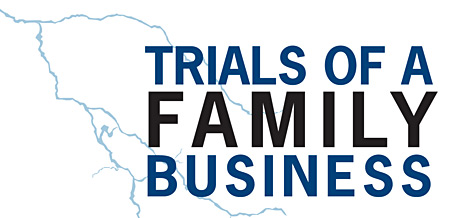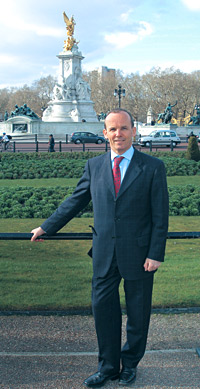| 
The Kellogg
School's Center for Family Enterprises supports alumni like
Grant Gordon '80, whose new book examines the ups and downs
of famous family ventures. He finds that those ties really can
bind By
Adrienne Murrill
The
Center for
Family Enterprises at the Kellogg School is home to
a small but rich library of case studies, articles, books,
journals and biographies about family business practitioners.
 |
|
| Grant
Gordon '80 outside Buckingham Palace in London |
|
| |
|
This
is where Grant Gordon '80 began his research for
his new book Family Wars: Classic Conflicts in Family
Business and How to Deal With Them (co-authored with
London Business School Professor Nigel Nicholson). The text
promises to take readers behind the scenes for a look at
the ups and downs of some of the world's biggest family
companies. In the end, the authors hope readers gain insight
into how to avoid the pitfalls that can decimate their businesses.
This goal of strengthening family business is shared by
Kellogg School experts like John
Ward, clinical professor of family enterprise.
"We
owe deep gratitude to our friend and professor John Ward.
He's been a leader in this area, and one of my inspirations
for this project," says Gordon, who himself hails from a prestigious
family business — William Grant & Sons, the Glasgow,
Scotland-based distiller. Ward, along with Lloyd
Shefsky, is co-director of the Kellogg Center for Family
Enterprises and has written several influential books on family
business.
Ward
says Gordon and Nicholson's book offers fresh psychological
insights into how family businesses work. "It's a very interesting,
compelling book that, through some of the troubles of others,
offers lessons for all and for family businesses particularly,"
says Ward.
When Gordon
studied at Kellogg, the school's family business resources
did not exist. But since its start in 1999, the center has
been a pioneer in this area, focusing on teaching, research
and case writing about family business strategy, governance,
succession and many other related topics. "Because Grant was
a Kellogg alumnus, he was able to come back and start this
project using our resources," says Carol Zsolnay '86,
assistant director of the Kellogg center.
"Today we
have a class and a very active student Family
Enterprise Club, but one thing we also offer is our resource
center," she says. The center offers these resources so that
students and alumni may discuss their family businesses with
their peers and learn from those experiences. "Our mission
is to serve our students and alums."
Family
or foe?
Gordon's
family business was founded in 1886 and remains controlled
by the family's descendants. It is the second-largest privately
owned business in Scotland and 10th-largest in Britain. Although
Gordon left William Grant's board of directors in 2003, he
continues to play a small role in the family foundation and
is a board member of Laurent-Perrier, the leading independent
family owned champagne house in France.
| |
| Family
friendly: More than 100 students from business-owning
families are enrolled at Kellogg in 2008. Some alumni
include:
Cynthia
R. Bigelow '86
R.C. Bigelow Inc.
James B. Ethier '66
Bush Brothers & Co.
William
T. Dillard '99
Dillard's Inc., U.S.S.
Curtis
Johnson III '83
JohnsonDiversey Inc.
Linda Johnson
Rice '87
Johnson Publishing
Karger
David Kohler '92
Kohler Co.
Michael
Baskin '83
Mark Shale
James S. Mills '57
Jonathan M. Mills '60
Andrew J. Mills '85
Medline Industries
Paul Hulseman '00
Richard Hulseman '00
Thomas Hulseman '01
Solo Cup Company
|
|
| |
|
He
also has applied his expertise as director general of the
Institute of Family Business, a nonprofit that promotes the
success and sustainability of U.K. family enterprises. These
experiences led Gordon to collect family stories and search
for patterns that eventually appeared in Family Wars.
There are
many proven advantages among family businesses, Gordon points
out, including their ability to survive longer than non-family
firms, to outperform on stock markets globally and to retain
their foothold in the economy. "But what I've seen through
my experience is that for every great strength, there's a
potential weakness," he says, emphasizing the word "potential."
Family
Wars focuses on what those weaknesses can be, how they
arise, how they impact the family business and how they can
be avoided by examining conflicts within some well-known families,
Gordon says. One example that comes up is an exclusive wine
company that ultimately was sold once the family patriarch's
disregard ended up alienating other family shareholders. In
some ways, this person was a fine businessman, Gordon notes,
but he did not succeed in rallying fellow shareholders around
a common vision.
"There are
some great lessons to be learned from the lives and stories
of these families because they're stories about entrepreneurial business families, about human
beings and their great strengths and, equally, the weaker
side of people," Gordon says. "We're hoping that the readers
will find it entertaining, but above all informative and valuable
for them as professionals, managers, board members and academics."
Gordon
says that writing this book has taught him the responsibility
of the senior generation to prepare the next generation of
family business leaders.
"We
should not try to dictate to the next generation their future,
but I think more importantly we can instill in them a sense
of pride in the family business and build in them a sense
of trust," he says. "If you can instill those values into
the next generation, you stand a good chance that they're
going to develop to be responsible owners, which will lead
both the family and the business to prosper."
|



